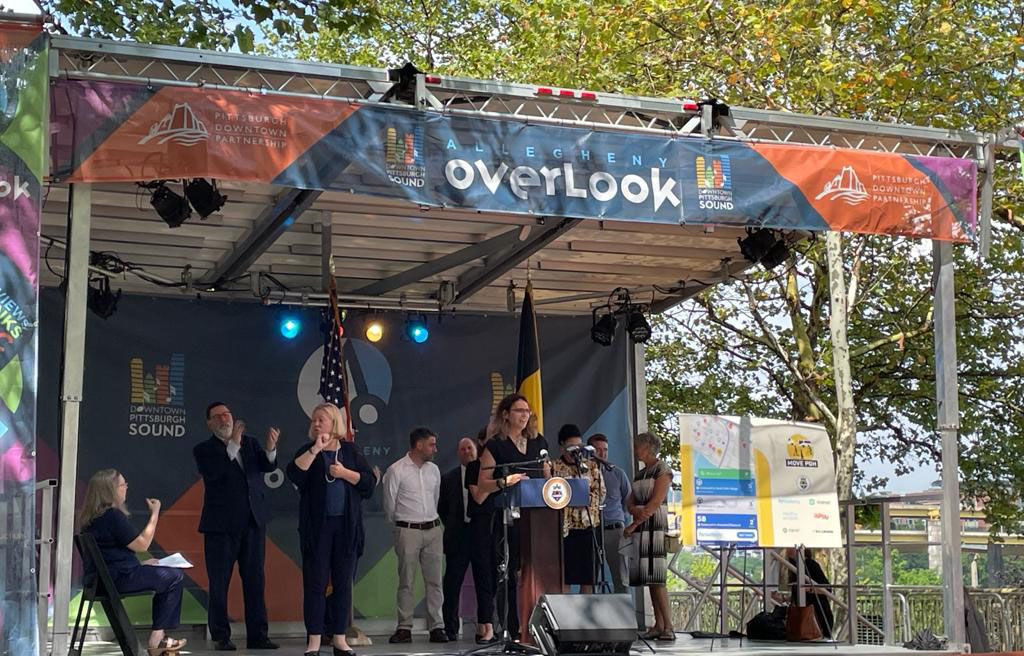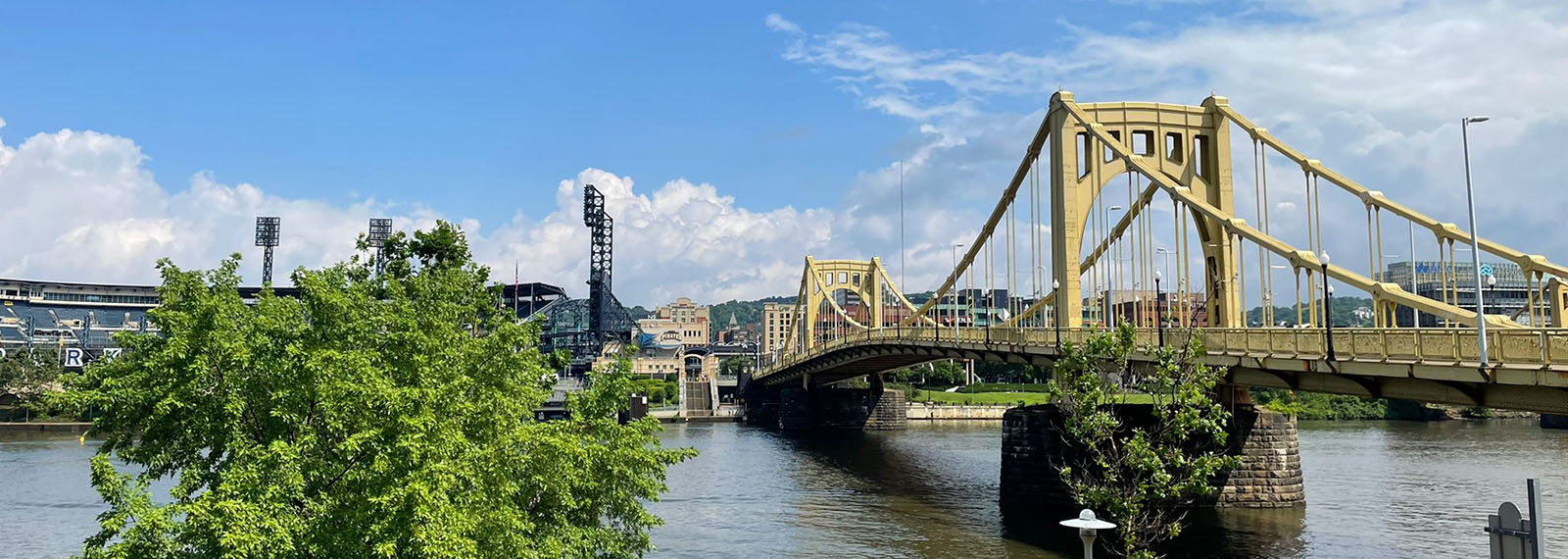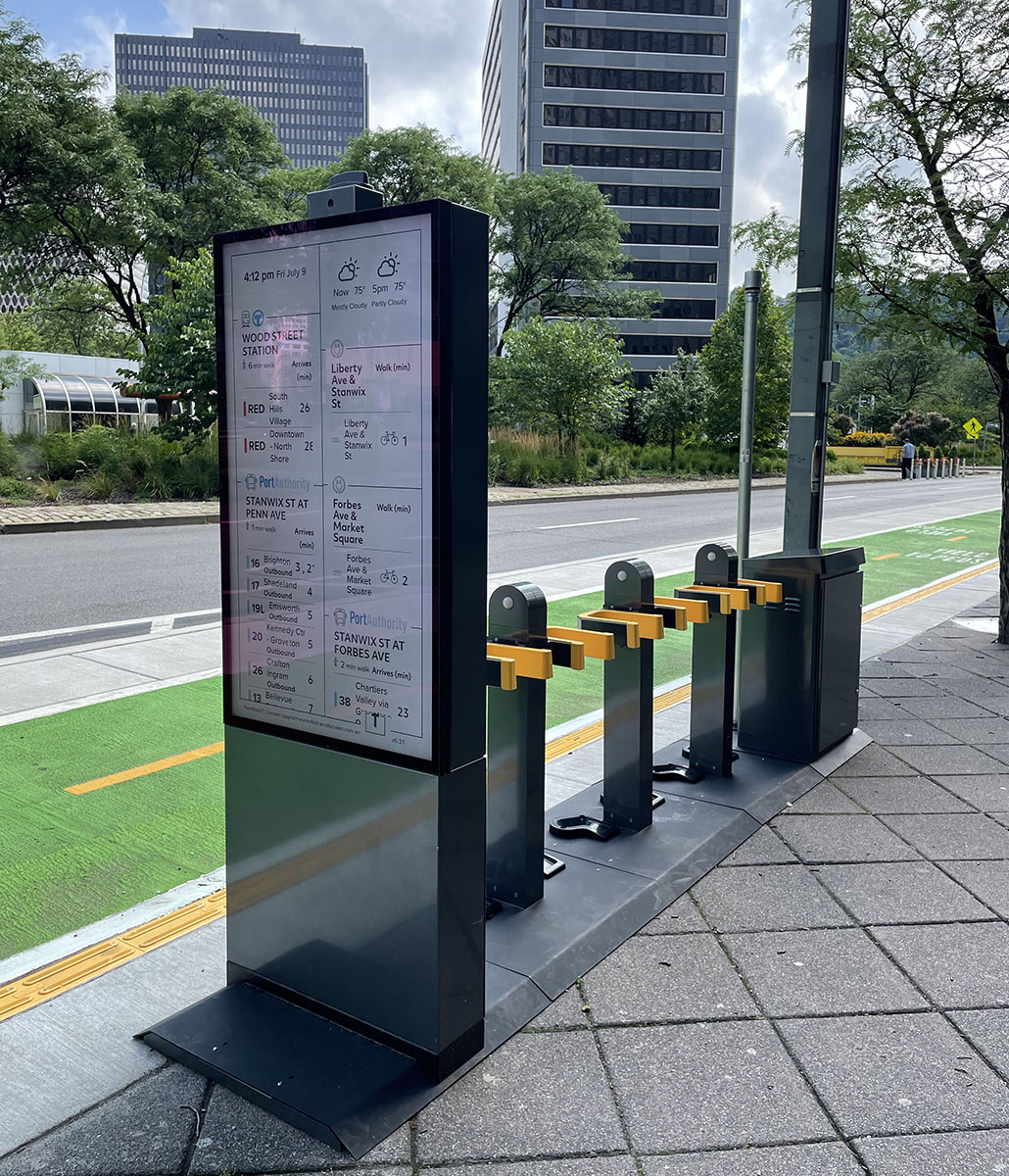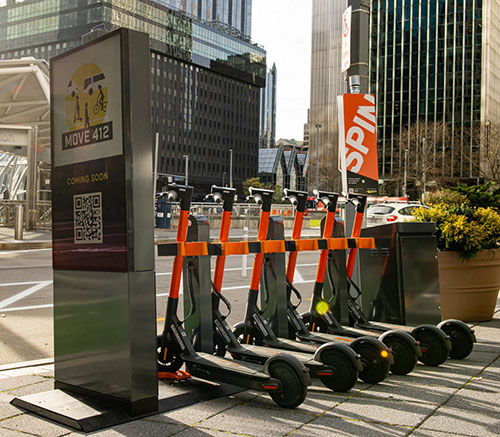The City of Pittsburgh worked with the Pittsburgh Mobility Collective (PMC) and other community stakeholders to launch Move PGH, an equity-focused mobility pilot designed to connect residents to accessible mobility options through a digital platform and physically via a multimodal network of mobility hubs.
Connecting the Steel City Through Mobility Hubs
In the 21st century, Pittsburgh has transformed from a Steel City to a Smart City, becoming a model among cities in the United States and a hub for urban innovation. Despite these advancements, Pittsburgh remains largely dependent on cars. 23% of households lack access to an automobile, and nearly one-third are ‘mobility insecure.’ Even for those with access to cars, economic mobility is challenged by the fact that only 40% of the region’s jobs are accessible within a 90-minute commute.
These trends exacerbate existing systemic inequities, making it even more challenging for city residents to access opportunities, goods and services because of the lack of affordable, safe and reliable mobility. This reality impacts economic and health outcomes, as well as counteracting the city’s sustainability goals.
A New Kind of Partnership
Under the leadership of former Mayor Bill Peduto, Pittsburgh’s Department of Mobility & Infrastructure (DOMI) formed to better serve residents and begin building a truly equitable, inclusive and sustainable city that enables all residents to access jobs, education, housing and food.
In response to the eagerness of new mobility operators to launch electric scooter (which remain illegal in the state of Pennsylvania but were legalized in Pittsburgh in June 2021) and electric bicycle programs in Pittsburgh, DOMI sought a solution that would bring tech-based mobility innovations to residents in ways that provide first- and last-mile connections to the city’s transit (Port Authority of Allegheny County) and bike-share (Healthy Ride) systems, while also prioritizing the needs of vulnerable communities, which often experience the unintended consequences of tech disruptions that are not strategically integrated into existing systems.
With NUMO’s guidance, DOMI issued a request for proposal that sought a collaborative coalition of mobility providers to work in partnership with the city and communities to develop an integrated and organized system of transportation. The winning proposal was from the Pittsburgh Mobility Collective, which launched in July 2019 and comprises Spin, Waze, Zipcar, Swiftmile, Ford Smart Mobility, Transit, Masabi and Scoobi.
The city’s vision of providing reliable, accessible mobility choices that connect all residents to opportunity involved a high degree of coordination among the PMC, DOMI, Healthy Ride and the Port Authority, as well as deep engagement with the community and the establishment of 'transit equity zones.' What emerged was an innovative and inclusive pilot program through which new mobility operators would establish a range of first- and last-mile transportation services that meet the needs of neighborhoods and residents and are accessible via a network of 50 mobility hubs located near transit stops and bike-share stations.
Prioritizing Engagement & Equity
Prior to the pilot launch, NUMO facilitated a two-year process involving greater collaboration, strategy and alignment among partners, and implementation of the program in the city. NUMO worked alongside CityFi to provide avenues for DOMI and the PMC to work effectively and collaboratively with the Port Authority, Healthy Ride, community-based organizations and other key stakeholders. Through this inclusive and transparent process, DOMI and the PMC deepened commitments to equity and engagement, which informed the city’s micromobility policies and helped to shape a plan for an ambitious integrated network of mobility hubs to increase access for lower-income communities.
Launching Move PGH
On July 9th 2021, the coalition of public, private and community stakeholders launched MovePGH, the first equitable mobility pilot designed to connect residents to accessible mobility options through a digital platform and physically via a multimodal network of 50 mobility hubs.

Key to this effort is expanding access for vulnerable communities to convenient, reliable and affordable mobility. The Port Authority has reduced costs for qualifying riders, and the agency’s ConnectCard, a partnership with HealthyRide, provides 15 minutes of free bike-share use. Spin’s Access program further builds on transit equity in the region by offering discounted e-scooter rides for low-income riders and opening up access for unbanked users and those without smartphones.
The two-year (2021-2023) pilot aims to address lack of access to safe, reliable mobility, which impacts Pittsburgh residents’ ability to get where they need to go — to get groceries, get to work or go to school — without relying on a car. The launch of Move PGH also enables the city’s Universal Basic Mobility (UBM) pilot, which provides up to 100 low-income residents with monthly transit subscriptions and shared mobility services to address mobility insecurity for a period of six months.
Media
- PRESS RELEASE: Pittsburgh Launches MovePGH, an Innovative Equitable Mobility Partnership, to Transform Transportation Access through Mobility Hubs
- July 9, 2021: Pittsburgh Launches Move PGH, A New Way To Navigate The City (WESA/NPR)
- July 9, 2021: Pittsburgh launches first mobility app initiative for non-car transportation in the U.S. (Pittsburgh City Paper)
- July 9, 2021: U.S. Finally Gets First Mobility as a Service Platform (Streetsblog USA)
- July 9, 2021: City of Pittsburgh launches Move PGH with promise of more accessible and equitable mobility (Pittsburgh Post-Gazette)
- July 12, 2021: Pittsburgh aims to make transit easier and more convenient with new platform that connects public and private transportation offerings in one hub (Pittsburgh Business Times)
- July 12, 2021: City of Pittsburgh and partners launch MaaS-focused, basic mobility initiatives (Mass Transit)
- July 21, 2021: Pittsburgh launches e-scooter pilot as part of Move PGH (Pittsburgh Business Times)
- July 22, 2021: Can Pittsburgh Make ‘Mobility as a Service’ Succeed? (Bloomberg CityLab)
- July 22, 2021: Pittsburgh's new MaaS platform and mobility hubs aim to support 'universal basic mobility' (Smart Cities Dive)
- July 26, 2021: Spin scooters creating buzz in Pittsburgh (Pittsburgh Business Times)
- July 27, 2021: Pittsburgh first city in U.S. to get MaaS platform (Global Fleet)
- August 9, 2021: The world is watching Pittsburgh’s new integrated Transit app (Next Pittsburgh)
- September 27, 2021: What will mobility equity look like in practice? (Cities Today)
- October 6, 2021: Spin e-scooter head talks parking enforcement and what sets Pittsburgh’s rollout apart (Pittsburgh City Paper)
Resources
- Move PGH Update - 1/22 (Move PGH)
- Mobility Hubs | The Multimodal Stations at the Centre of Everything (Intertraffic)
- Mobility Hubs: Lessons and Learnings from Pilots in Minneapolis and Boston (Urbanism Next)
- ‘Mobility Hubs’ Become Community Anchors in Minneapolis (Next City)
- Collaborative Project Promises Equitable Transit in Austin (Government Technology)
- Oakland’s ‘universal basic mobility’ pilot gets underway (Cities Today)
- 2020 Mobility Hubs Pilot Report (City of Minneapolis)
- Mobility Hubs — A Reader's Guide (LADOT)
- Mobility Hubs of the Future (RISE)
- Managing Mobility Hubs - Bremen x Malmö x Duckt x CoMoUK, May 2021 (Mobility Makers)
- Todd Litman: Five Predictions on New Mobility (Viewpoint Vancouver)
Header image: Shafaq Choudry, NUMO


